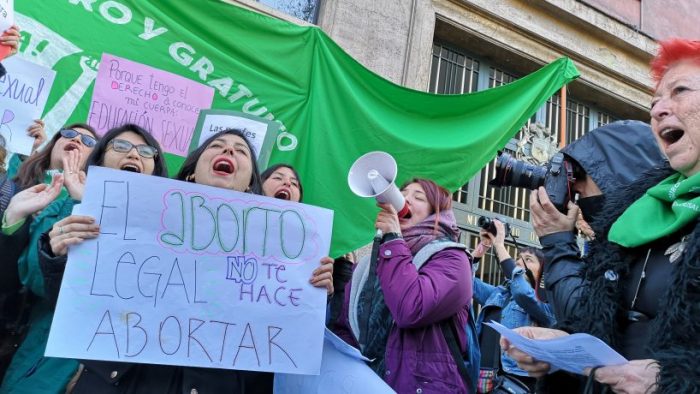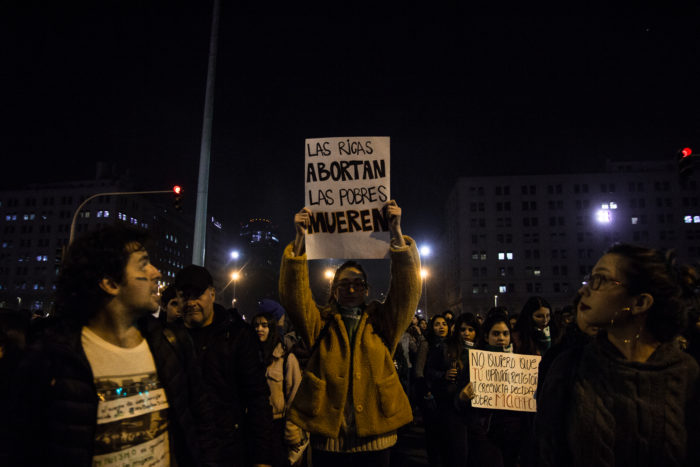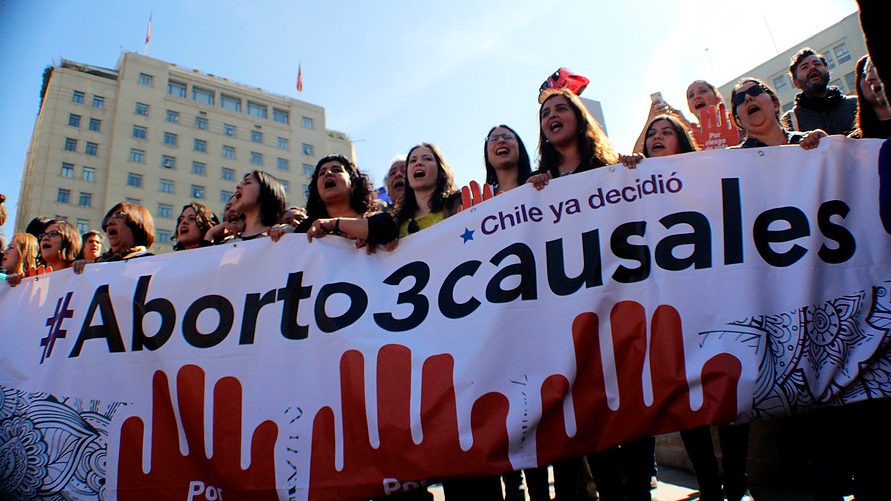In September 2017, the Chilean Government, then under the presidency of Michelle Bachelet, passed Law 21030, known later as the Ley Tres Causales, which decriminalised abortion for the first time since 1989 on three grounds: when the pregnancy risked the mother’s life; when the foetus is unviable; or when the pregnancy is the result of rape.

However, a report published at the end of last year by the Consejo para la Transparencia (Council for Transparency) revealed that the law itself is not being properly implemented, with a significant lack of access to information and transparency and failures amongst healthcare providers to create and publish protocols.

The passage of this law marked a step forward for women’s reproductive rights in Chile, although it has been criticised by many feminists: ‘No bastan tres causales’ Three grounds are not enough. It has particularly come under fire for the conscientious objector clause, which allows medical practitioners to deny patients abortions on religious or moral grounds.
This recent report shows that even this limited law is not serving all who are capable of becoming pregnant in the way it should.
Between January 2018 and December 2020, a total of 2,192 pregnancies presenting to public health providers were eligible for abortion on one or more of the three grounds recognised under the law. Ministry for Health (MINSAL) statistics used in the report show that 1,827 (83 per cent) of those cases led to abortion. The majority gave as grounds the unviability of the foetus (883), followed by the risk to the mother’s life (573). Abortion where the pregnancy was the result of rape were the least common (371).

Pregnancy as a result of rape
MINSAL’s figures suggest that in the remaining 365 cases, the patient decided to continue the pregnancy. However medical practitioners’ lack of information, an absence of internal protocols, the number of conscientious objectors and an absence of the drugs required to end the pregnancy have been found to affect and limit implementation of the law.
The Consejo’s report surveyed 50 self-managed hospitals (hospitals which lie within the national health system but are independently managed), two non-self-managed hospitals, four hospitals for the armed forces and police, 16 Seremis (regional health authorities), 29 regional health services, and six state administrative offices.
According to the report, between 2019 and 2020, healthcare centres reported 120 cases where the pregnancies resulted from sexual crimes. Of these, 14 were rejected for ‘not meeting the requirements established by law’, in some cases for ‘implausibility of the account’. In a further five cases, the request for a termination was rejected because the pregnancy had exceeded the 14 weeks’ gestation limit. The survey found 48 establishments which recorded no cases where the abortion was not carried out, either because all cases led to abortion, or because they failed to collect the data..
Lack of public information
The report’s main criticism is the lack of information about access to abortion available to the public, which may have led to the patients’ late arrival. None of the providers surveyed published their protocols (practices, procedures, techniques, and requirements) relating to the three grounds law. One in three were unable to produce a document with that information when requested, either because they do not have such a document or because they do not send it out.

The lack of publicly available protocols means that patients do not know where they can access the service, what will happen, what their rights are, and what are the requirements.
In a similar fashion, the report concludes that the low number of complaints relating to abortion services is not due to any virtues of the present service, but rather to ignorance about how to make a complaint and the absence of basic information on free access platforms.
When asked about complaints made by patients, the providers indicated that no audits or follow-ups had been carried out, giving as excuses either the recent implementation of the law or the pandemic. One provider claimed to have carried out 11 inspections of the procedure, during which it found no irregularities or incompliance. In total only 11 cases of 1,458 sought in the public healthcare system were scrutinised, and at only one healthcare centre out of 29.
In other cases, the providers suggested that the audits were carried out by the Health Superintendency. The Health Superintendency, on the other hand, indicated that it had not carried out any audits for Law 21030 in the period investigated and that between 2019 and 2020 it had received only three complaints against providers relating to that law. No more details about the complaints were provided, other than that they related to the ‘rights and obligations of the patients’.
The findings suggest a severe and disturbing lack of understanding and practice of the law within the healthcare system, which is failing those seeking to terminate a pregnancy at an already difficult time.
The green wave
Nevertheless, there is hope for an expansion and improvement of the law. Since December 2020, the green wave movement in favour of decriminalising abortion has taken hold in Latin America, with successes first in Argentina, then Mexico, and most recently Colombia. There are similar movements in Chile.
In November last year, the Chilean Government rejected a bill (65 against; 62 in favour; 1 abstention) to allow abortion up to 14 weeks’ gestation at the decision of the woman, no matter the circumstances or motive. Nonetheless, Sebastian Piñera’s conservative government will leave office on 11 March to make way for Gabriel Boric, with his promises of social progress.

There are reasons to believe that Boric’s government will make changes to improve reproductive and sexual rights. His manifesto included a significant section about feminism, which included legalisation of a free, legal and safe abortion. He has also nominated four subsecretaries of the new government from the Feminist Front (a section of the Convergencia Social party to which Boric belongs). The incoming First Lady, Irina Karamanos, is the national head of the Feminist Front and has pledged to modernise and regulate her new role.
In the meantime, various groups have submitted proposals to the Constituent Assembly tasked with re-writing the country’s constitution. The National Association of Matrons of Chile (ASOMAT, by its Spanish initials) submitted a proposal to include comprehensive reproductive rights in the new constitution. The proposal includes the creation of the National Directorate of Sexual and Reproductive Health, ‘centred on reproductive and sexual rights’ and ‘with emphasis on the prevention of gender-based violence and obstetric violence’. Among other points, the proposal calls for the elimination of conscientious objection by health service staff, equitable access to contraceptives throughout the country, and respect for abortion and the right to decide, guaranteeing access and quality care up to 14 weeks of gestation.
The Permanent Assembly for the Legalisation of Abortion in Chile also similarly submitted a proposal to the Assembly to change the Three Grounds Law. Their proposal includes recognition of sexual and reproductive rights and sexuality, the right to holistic sexual education, information about and access to contraceptives, and access to abortion.
If the proposals pass, or if the new president is able to pass new laws that will improve sexual and reproductive rights in Chile, this report shows that there also need to be mechanisms to guarantee these rights through data and information transparency as well as regularisation.
In Chile, estimates suggest between 60,000 and 80,000 clandestine abortions in cases that do not meet the three grounds criteria take place every year, often in unsafe conditions that can place the woman’s safety or life at risk.

